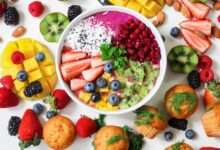Impatient to change your silhouette, to rethink your eating habits, to do better, the temptation to follow drastic and radical diets is great. However, it is possible to refine your silhouette and improve your health, without getting frustrated!
Tip n°1: balance your plate
Harvard Medical School recommends filling half your plate with a variety of fruits and vegetables. A quarter of your plate should consist of carbohydrates rich in fiber such as bread, pasta or brown rice. The remaining quarter must provide animal and vegetable proteins while avoiding an excess of red meats. It is important to stay well hydrated while avoiding sugary drinks. For cooking, oils such as olive or rapeseed (canola) oil are preferable to butter.
| Tip: imagine your plate as a circle cut into parts and try to get closer to the proposed visual. |
Sources
Note: Good to know: The multiplicity of diets and modern lines of research focus mainly on the risks versus benefits of isolated nutrients. It is a question of limiting fat and cholesterol, increasing the consumption of fiber and calcium, taking vitamins E, C and D or even limiting carbohydrates with a high glycemic index. As scientists acquire new knowledge, however, it seems that the beneficial effects of food come rather from beneficial interactions between different nutrients. This leads to adopting a more global approach to nutrition based on the consideration of dishes in their entirety rather than isolated foods.
Tip n°2: bet on fruits and vegetables
Fruits and vegetables are high in fiber and contain vitamins and minerals not found in most dietary supplements. They help to reduce blood pressure, cholesterol levels and inflammation as well as fight against insulin resistance in cells. These effects have a direct impact on the reduction of cardiovascular pathologies and type 2 diabetes.
| Tip: frozen, dried or canned fruits can be nutritionally satisfying, especially since they are sometimes more convenient to eat. |
Tip n°3: Choose the right fats
Not all fats should be banned. Just select those that are good for the body and reduce those that are less so. Good fats include monounsaturated and polyunsaturated fatty acids. You will find these good fatty acids in fish, avocado, seeds, nuts, vegetable oils and more specifically rapeseed oil (canola). Bad fats include saturated fatty acids and trans fatty acids found in fried foods, pastries, cold cuts and dairy products.
| Tip: The National Agency for Food, Environmental and Occupational Health Safety in France (ANSES) recommends a consumption of good fats at 35 to 40% of your total daily energy intake1. For an individual consuming 2000 kcal per day, the good fats could therefore represent between 700 and 800 kcal. It is important to respect this range to cover your essential fatty acid needs and thus preserve your health. |
Sources
Source: http://www.anses.fr/sites/default/files/documents/NUT-fi-ApportGraisses.pdf
Tip n°4: Focus on Complete Products
Fast sugars create insulin spikes in the body which promote the production of triglycerides and the increase of bad cholesterol. Choosing slow and complete sugars, on the other hand, guarantees you a supply of fibre, vitamins, minerals and antioxidants that are often absent from refined products such as bread or white rice, pasta or overcooked potatoes.
| Tip: keep the skin of the potatoes because it is rich in fiber and do not hesitate to explore the diversity of slow sugars by cooking quinoa, millet, whole wheat or brown rice. Learn how to monitor food packaging labels: good whole grains should contain ten times more carbohydrates than fibre. |
Tip n°5: Say « no » to sugary drinks
It is recommended not to drink more than one glass of sugary drink per day. Whether it’s sodas, iced teas, fruit juices, energy or energy drinks, these drinks are high in fast sugars and calories. A link between the excessive consumption of this type of drink and the risk of overweight or obesity has been demonstrated in the United States1.
| Tip: If you like to drink fruit juice, focus on choosing the highest quality juice possible. The mention “100% fresh fruit juice” is to be preferred, followed by the mentions “100% fruit juice” and “100% pure juice”. Avoid fruit juices “made from concentrated juices”, “nectars” or “flavored drinks” which are supplemented with water, sugars or even chemical additives. |
Sources
Source: Consumption of sugary drinks: relationship with overweight and obesity, Jean Dlongeville, Volume 47, Issue 2, April 2012, Pages 66–71
Tip n°6: Drink enough water
Water is essential for life and the feeling of thirst means that you should have been drinking long before. Do not wait to be thirsty to drink but get into the habit of hydrating regularly throughout the day. It is advisable to drink 1.5 to 2L per day. Any sports practice increases this consumption by about 1L per hour of effort and leads to the consumption of isotonic drinks. Dehydration is undesirable as it quickly leads to a decline in lucidity and performance. In addition, the consumption of water makes it possible to inflate the fibers consumed via food, which reinforces the feeling of satiety in the stomach. This combination is favorable for regulating your appetite, especially when calorie restriction is desired.
| Tip: any liquid food such as tea, coffee, soups, juices contains water and is considered in the recommended daily intake. |
Tip n°7: Have a lighter hand on the salt
Like any mineral, the sodium chloride contained in salt is important in maintaining chemical balances in the body. However, its consumption is very often excessive. The recommended doses are one teaspoon of salt per day. This dose must include the salt assimilated in one day in all its forms. However, the processed products on the market already contain much more salt than necessary. Ideally, you should not add extra salt to your dishes and limit the consumption of prepared meals as much as possible.
| Tip: favor fresh products, cook your dishes as much as possible yourself and don’t hesitate to watch the food labels. One teaspoon of salt per day corresponds to 2.3mg of sodium. This dose should be your maximum acceptable over a day. |
Sources
Source:
Tip n°8: Choose a good diet over food supplements
A balanced diet should be able to exempt you from taking vitamin and mineral supplements. However, there are nuances to be made with regard to vitamin D, iron or magnesium, which are the cause of frequent deficiencies. Folic acid or vitamin B9 is also essential, especially for pregnant women in whom deficiencies can be detrimental to the proper development of the foetus1.
| Tip: Avoid self-diagnosis. A consultation with your doctor and a blood test will allow you to precisely identify your shortcomings and compensate for them in an effective and adjusted manner. Too much magnesium or too much iron can be as harmful as too little. |
Sources
http://www.anses.fr/fr/content/vitamine-b9-ou-acide-folique Source : http://www.anses.fr/fr/content/vitamine-b9-ou-acide-folique
Tip n°9: Eat when you’re hungry
Dominique Poulain, dietitian nutritionist, specifically addresses the subject of the « good time » to eat meals or snacks. Take care to fully grasp the taste of the food you eat and chew it slowly. Taking food too quickly and without adopting a full awareness of the act will not give your brain time to receive hormonal signals of satiety. On the contrary, this leads to food intake exceeding your real needs as well as a lost opportunity to indulge yourself. The time of the meal does not matter as long as it is guided by real hunger and provides your body with an adjusted caloric intake.
| Tip: promote moments of meal sharing. The community reinforces the pleasure associated with food intake. Otherwise, avoid eating while walking, sit down, if possible elsewhere than at your desk or in front of your computer. A meal is a time for oneself, a time dedicated to well-being. |
Tip n°10: Keep your drinking under control
The effects of alcohol on health are paradoxical and sometimes contradictory. On the one hand, moderate alcohol consumption of around one drink per day would have beneficial effects on the heart by limiting the risk of heart attacks, increasing good cholesterol and reducing the risk of type 2 diabetes. On the other hand, this same volume would increase the risks of breast cancer and this significantly with the quantity consumed.
| Tip: Alcohol contains empty calories that work against the pursuit of eating nutritionally rich foods. The occasional pleasure of a drink of alcohol may not be totally repressed, but it is important to keep a close control on its consumption. |
Tip n°11: Don’t Skip Breakfast
It is often repeated: breakfast is the most important meal of the day. The time taken for breakfast is not wasted time but time given to your body and your mind at the start of a day. This full-fledged meal makes it possible to limit untimely snacking during the morning, hypoglycaemia before lunch and the resulting reduced alertness.
| Tip: a balanced breakfast contains proteins found in eggs, cheese, yogurts; carbohydrates rich in fiber such as bread or whole grains and fresh, dried or stewed fruit. Complement your breakfast with the drink of your choice. |
Tip n°12: Do not hesitate to have snacks
Splitting food intake is recommended for people who tend to suffer from eating disorders and quickly feel bad in a situation of hypoglycemia. Punctual snacks help stabilize blood sugar and prevent dips. In general, snacks of 100 to 150 kcal are recommended. Plan your food breaks and do not endure them! Providing a fruit or dairy product will prevent you from impulsively consuming crisps or chocolate bars in the grip of hunger.
| Tip: Get into the habit of drinking a large glass of water 15 minutes before your snacks to help satisfy your empty stomach and promote satiety. |

